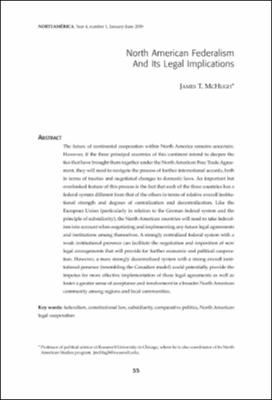Mostrar el registro sencillo del ítem
North American Federalism And Its Legal Implications
| dc.rights.license | http://ru.micisan.unam.mx/page/terminos | |
| dc.contributor.other | Maldonado Rivera, Silvia | |
| dc.creator | McHugh, James T. | |
| dc.date.accessioned | 2019-04-10T15:33:53Z | |
| dc.date.accessioned | 2022-02-16T23:42:46Z | |
| dc.date.available | 2018-12-14T00:20:46Z | |
| dc.date.available | 2022-02-16T23:42:46Z | |
| dc.identifier.issn | 1870-3550 | |
| dc.identifier.uri | https://ru.micisan.unam.mx/handle/123456789/19947 | |
| dc.format | application/pdf | |
| dc.format.extent | pp. 55-83 | |
| dc.language.iso | eng | |
| dc.publisher | Universidad Nacional Autónoma de México, Centro de Investigaciones sobre América del Norte | |
| dc.relation.isformatof | ||
| dc.relation.ispartof | Norteamérica: Revista Académica del CISAN-UNAM | |
| dc.relation.requires | Adobe Acrobat | |
| dc.subject | CIENCIAS SOCIALES | |
| dc.subject.lcsh | Sociology | |
| dc.title | North American Federalism And Its Legal Implications | |
| dc.audience | Investigadores | |
| dc.audience | Maestros | |
| dc.audience | Estudiantes | |
| dc.audience | Medios de comunicación | |
| dc.coverage.placeofpublication | México | |
| dc.description.abstracteng | The future of continental cooperation within North America remains uncertain. However, if the three principal countries of this continent intend to deepen the ties that have brought them together under the North American Free Trade Agrement, they will need to navigate the process of further international accords, both in terms of treaties and negotiated changes to domestic laws. An important but overlooked feature of this process is the fact that each of the three countries has a federal system different from that of the others in terms of relative overall institutional strenght and degrees of centralization and decentralization. Like the European Union (particularly in relation to the German federal system and the principle of subsidiarity), the North American countries will need to take federalism into account when negotiating and implementing any future legal agreements and institutions among themselves. A strongly centralized federal system with a weak institutional presence can facilitate the negotiation and imposition of new legal arrangements that will provide for further economic and political cooperation. However, a more strongly decentralized system with a stron overall institutional presence (resembling the Canadian model) could potentially provide the impetus for more effective implementation of these legal agreements as well as foster a greater sense of acceptance and involvement in a broader North American community among regions and local communities. | |
| dc.educationlevel | Superior | |
| dc.educationlevel | Posgrado | |
| dc.identifier.cisan | N_2009_0004_0001_0055 | |
| dc.identifier.conacyt | CONACYT | |
| dc.identifier.eissn | 2448-7228 | |
| dc.relation.issue | 1, enero-junio | |
| dc.relation.volume | 4 | |
| dc.rights.accesslevel | openAccess | |
| dc.rights.creativecommons | http://creativecommons.org/licenses/by-nc-nd/4.0 | |
| dc.source.isbn | 1870-3550 | |
| dc.subject.conacyt | 5 | |
| dc.subject.keywordseng | federalism | |
| dc.subject.keywordseng | constitutional law | |
| dc.subject.keywordseng | subsidiarity | |
| dc.subject.keywordseng | comparative politics | |
| dc.subject.keywordseng | North American legal cooperation | |
| dc.subject.keywordsspa | federalismo | |
| dc.subject.keywordsspa | derecho constitucional | |
| dc.subject.keywordsspa | subsidiariedad | |
| dc.subject.keywordsspa | política comparada | |
| dc.subject.keywordsspa | cooperación legal en América del Norte | |
| dc.subject.unam | Sociología | |
| dc.type.spa | article | |
| dc.view.accesslevel | DISPONIBLE | |
| dc.date.copyrighted | [ca. 2009] |
Ficheros en el ítem
Este ítem aparece en la(s) siguiente(s) colección(ones)
-
Artículos [469]
MiCISAN, Repositorio Institucional
Hecho en México, todos los derechos reservados 2018. Esta página puede ser reproducida con fines no lucrativos, siempre y cuando no se mutile, se cite la fuente completa y su dirección electrónica. De otra forma, requiere permiso previo por escrito de la institución.
Sitio Web administrado por: Centro de Investigaciones sobre América del Norte • micisan@unam.mx








